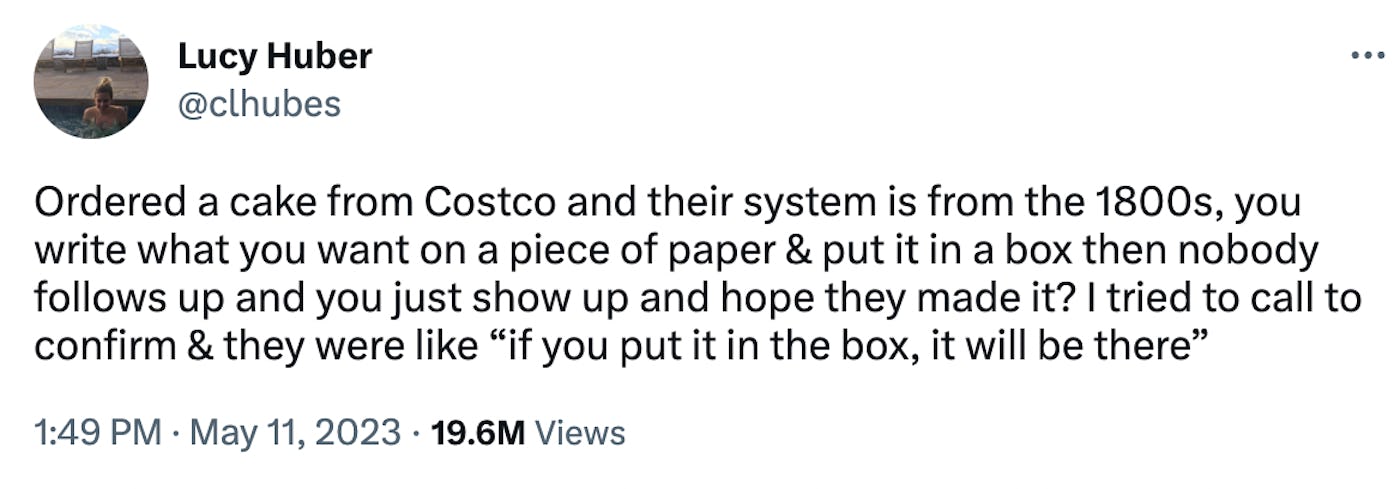Inverse - 🧠 Let’s Talk About Alcohol And Anxiety
| |||||||||||||||||||||||||||||||||||||||||||||||||||||||||||||||||||||||||||||||||||||||||||||||||||||||||||||||||||||||||||||||||
|
Older messages
☢️ Josh Duhamel Is Obsessed With His Doomsday Prepper Cabin
Friday, May 19, 2023
Plus: The dark history behind Martin Scorsese's next movie.
⚡️ How Nothing Plans To Make The Phone 2 A Big Success
Thursday, May 18, 2023
Plus: Fast & Furious has finally become a parody of itself.
💨 The Chase That Changed Fast & Furious Forever
Wednesday, May 17, 2023
Plus: Was the Starship explosion a health hazard?
🍿 Stephen Root Finally Gets His Revenge
Tuesday, May 16, 2023
Plus: Elon Musk's biographer exposes the “dirty secret of aerospace.”
💉 Shots Of The Future
Monday, May 15, 2023
Plus: Astronomers discover the source of the brightest cosmic blast ever recorded.
You Might Also Like
AI chatbots keep failing every accuracy test thrown at them
Wednesday, March 12, 2025
PLUS: Why Substack's new subscriber milestone is so significant ͏ ͏ ͏ ͏ ͏ ͏ ͏ ͏ ͏ ͏ ͏ ͏ ͏ ͏ ͏ ͏ ͏ ͏ ͏ ͏ ͏ ͏ ͏ ͏ ͏ ͏ ͏ ͏ ͏ ͏ ͏ ͏ ͏ ͏ ͏ ͏ ͏ ͏ ͏ ͏ ͏ ͏ ͏ ͏ ͏ ͏ ͏ ͏ ͏ ͏ ͏ ͏ ͏ ͏ ͏ ͏ ͏ ͏ ͏ ͏ ͏ ͏ ͏ ͏ ͏ ͏ ͏
Everything We’ve Written About That’s on Sale at Nordstrom
Wednesday, March 12, 2025
Plus: Actually cute plus-size maternity clothes. The Strategist Every product is independently selected by editors. If you buy something through our links, New York may earn an affiliate commission.
What A Day: Bad Car-ma
Tuesday, March 11, 2025
Elon Musk's politics are sparking a major Tesla backlash, ironically thanks to Trump. ͏ ͏ ͏ ͏ ͏ ͏ ͏ ͏ ͏ ͏ ͏ ͏ ͏ ͏ ͏ ͏ ͏ ͏ ͏ ͏ ͏ ͏ ͏ ͏ ͏ ͏ ͏ ͏ ͏ ͏ ͏ ͏ ͏ ͏ ͏ ͏ ͏ ͏ ͏ ͏ ͏ ͏ ͏ ͏ ͏ ͏ ͏ ͏ ͏ ͏ ͏ ͏ ͏ ͏ ͏ ͏
Rohingya refugees just lost half of their food aid. Now what?
Tuesday, March 11, 2025
An interview with Free Rohingya Coalition what happened last week in Asia, Africa and the Americas Hey, this is Sham Jaff, a freelance journalist focused on Asia, Africa and the Americas and your very
Shayne Coplan’s Big Bet Is Paying Off
Tuesday, March 11, 2025
March 11, 2025 THE MONEY GAME Shayne Coplan's Big Bet Is Paying Off By Jen Wieczner Photo: Dina Litovsky At 6 am on Wednesday, November 13, eight FBI agents in black windbreakers burst through the
We need your input.
Tuesday, March 11, 2025
Share your insights & receive a 70% off forever.
We Talkin’ About Practice?
Tuesday, March 11, 2025
Nobody Told Me There'd Be Days Like These ͏ ͏ ͏ ͏ ͏ ͏ ͏ ͏ ͏ ͏ ͏ ͏ ͏ ͏ ͏ ͏ ͏ ͏ ͏ ͏ ͏ ͏ ͏ ͏ ͏ ͏ ͏ ͏ ͏ ͏ ͏ ͏ ͏ ͏ ͏ ͏ ͏ ͏ ͏ ͏ ͏ ͏ ͏ ͏ ͏ ͏ ͏ ͏ ͏ ͏ ͏ ͏ ͏ ͏ ͏ ͏ ͏ ͏ ͏ ͏ ͏ ͏ ͏ ͏ ͏ ͏ ͏ ͏ ͏ ͏ ͏ ͏ ͏ ͏ ͏ ͏ ͏ ͏
Seattle startup takes eco-friendly aim at recycling clothing
Tuesday, March 11, 2025
Read AI rolls out enterprise search tool | Hard time for hardware ADVERTISEMENT GeekWire SPONSOR MESSAGE: A limited number of table sponsorships are available at the 2025 GeekWire Awards: Secure your
☕ The beauty of it all
Tuesday, March 11, 2025
A conversation with Ulta Beauty's CMO. March 11, 2025 View Online | Sign Up Marketing Brew Presented By Iterable It's Tuesday. Count Kathy Hochul as an ad buyer. The governor of New York is
🤔 What’s in your wallet? A scam.
Tuesday, March 11, 2025
Plus, a new streaming deal is the latest gift to Trump from the billionaire CEO and his company — which profits off government contracts. Forward this email to others so they can sign up 🔥 Today on



